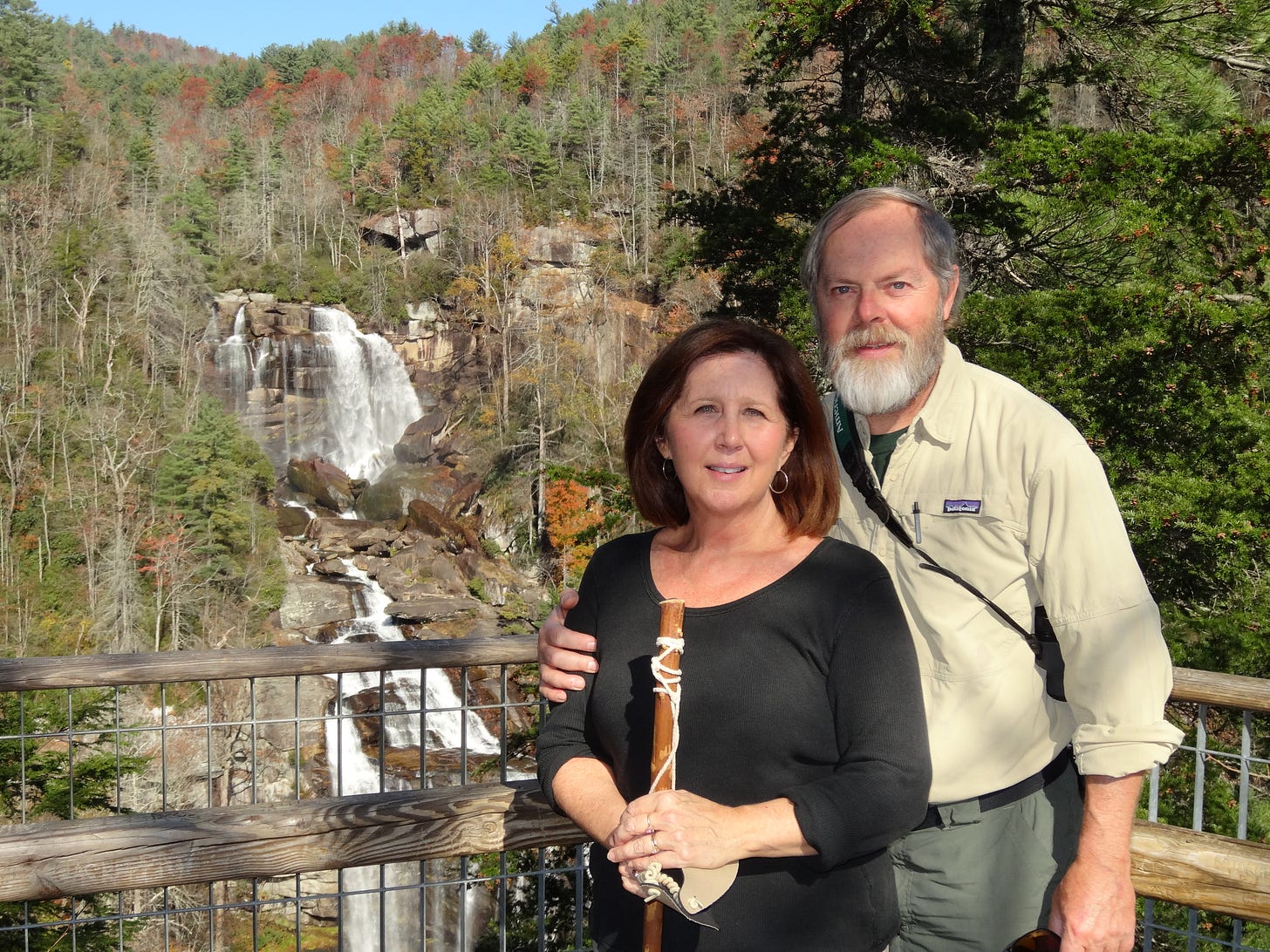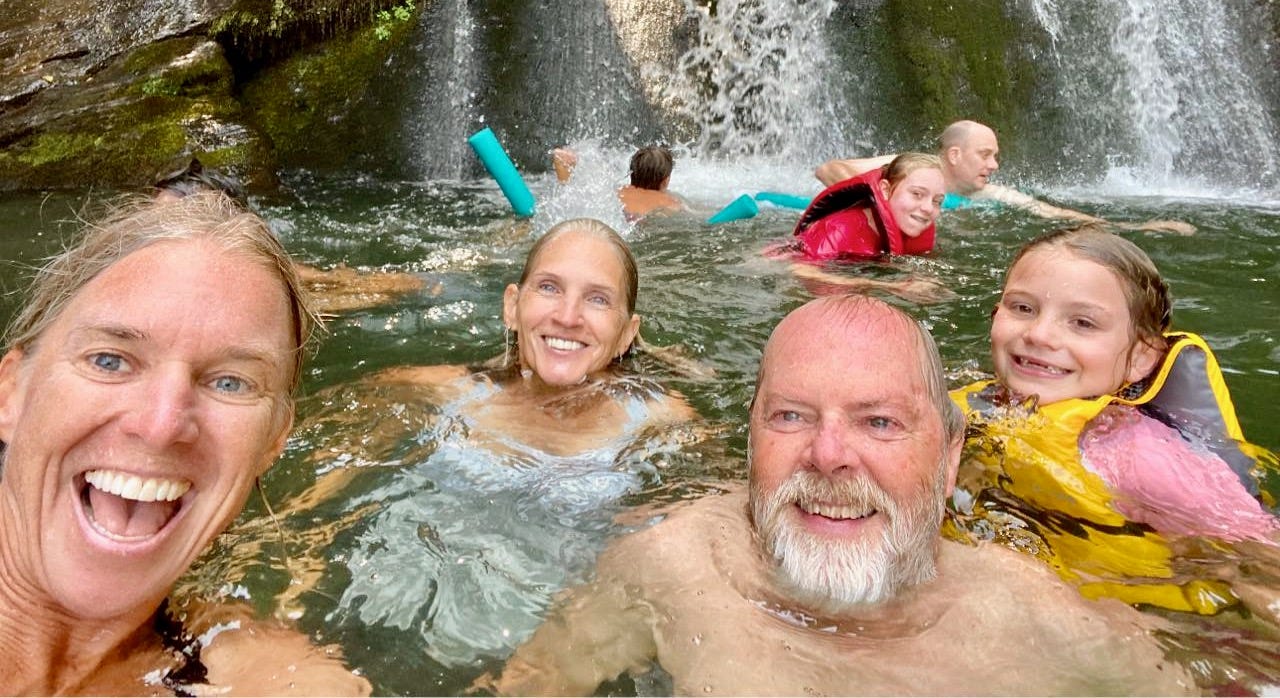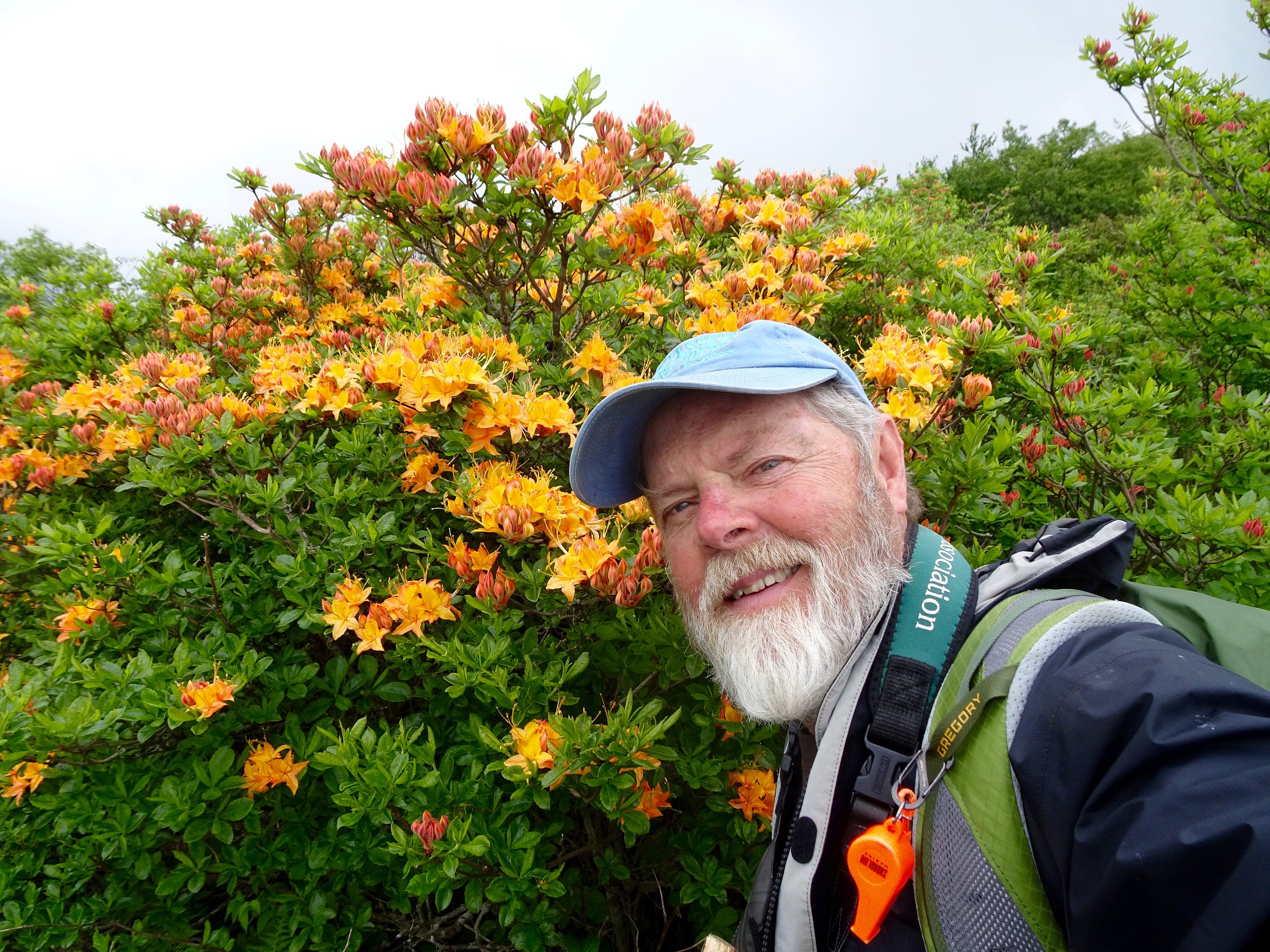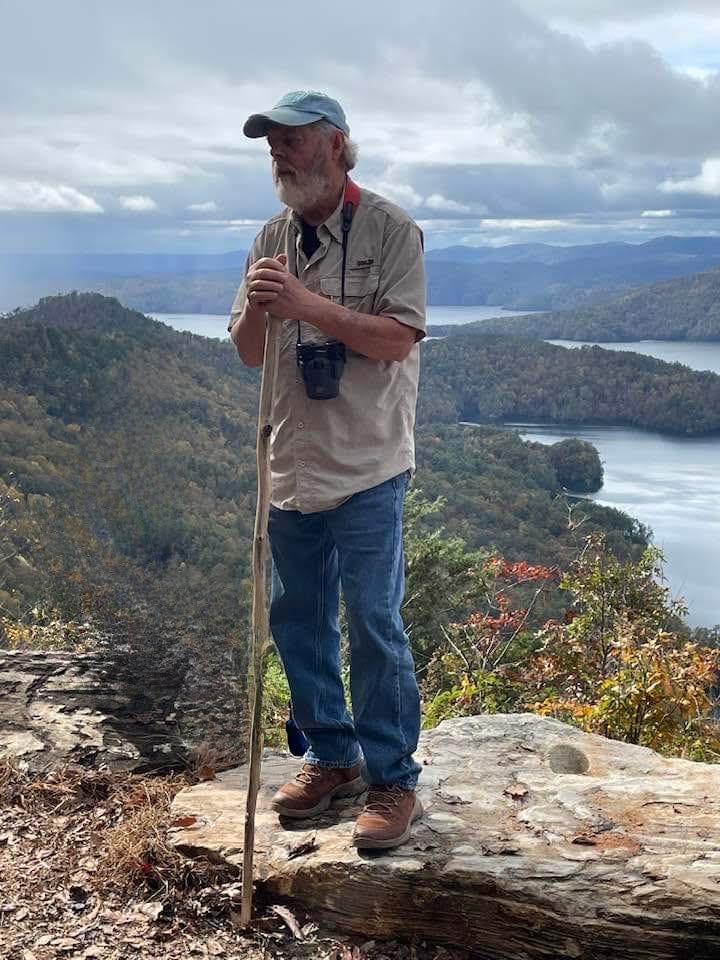This is a series of flash interviews with people I admire, people who are doing something—anything, a lot of things—for the Earth. These folks walk the walk, each of them in their own way, using their own unique skillset. They dedicate their energy, their time, and their hearts to a crucial cause: the preservation of this precious planet we call home.
I met Dan Whitten years ago, aboard a pontoon boat on one of our beautiful mountain lakes here in the Blue Ridge. Dan was the resident naturalist on board, assigned to point out interesting features as we putt-putted along the shoreline.
My strongest memory from that excursion was a small tree growing close to the water. I saw its delicate white blooms and figured it was a dogwood. Dan set me straight.
“That’s a serviceberry,” he said. “My favorite spring bloomer. A fantastic native species!” I heard the wonder in his voice. Thanks to Dan and that day, I now have a serviceberry growing in my native garden.
It’s not a stretch to say that Dan has inspired thousands of people to appreciate the botanical wonders in this part of the world. As a Master Naturalist, he spends many of his weekends leading field trips for various outdoor organizations, at sites from the Foothills Trail to the Blue Ridge Parkway. Summers find him leading those boat tours and in the fall, he helps teach students in the Upstate Master Naturalist class.
Maybe most importantly, Dan serves as president of the statewide South Carolina Native Plant Society, leading that organization’s mission of “Protect, Restore, Educate.” Recently he attended Lobby Day at the S.C. State Capitol, advocating for conservation issues. Then Dan enlisted his friend Frank Holleman, an environmental lawyer and fellow native plant enthusiast, to spearhead a campaign that will inform SCNPS members about important legislative issues related to protected endangered native ecosystems.
( Frank Holleman was the first person I profiled here in Champions of Nature, almost two years ago. You can read that article here. )
Dan and his wife Sherrie, who shares his passion for native plants and exploring the natural world, live in a woodland log home in Spartanburg County. They have two daughters and five grandkids.
Here’s what Dan shared with me about his joy in constantly learning new things of the natural world.
Dan, please tell us about some of your early experiences in nature.
I grew up in Huntsville, Alabama, where my dad and I would make frequent trips to the Smokies for camping and hiking. My best friend and I began hunting, camping and riding motorcycles through the woods together. He later became a forestry major and I studied Wildlife Management, both at Auburn. One of the girls I dated in high school liked to hike and when we walked along, she would name all the plants and tell how they could be used. That made me want to learn those things, too. After college graduation, a wildlife management job was hard to find so I began a career with Michelin. When I moved to South Carolina at age 27, I met a new friend, Rich, who liked to paddle. He and I canoed and kayaked. When I met my wife Sherrie at church, we began hiking and paddling together, too. I found out she had a better tent than mine, which sealed the deal. Eventually Sherrie and I, along with Rich and his wife, raised our kids family camping together, near whitewater rivers and on wilderness canoe trips.

How did those early experiences shape your relationship with the natural world?
One of my favorite classes at Auburn was plant physiology. That was when I started learning many of those native plants. We had a field trip to the Smokies during the Spring Wildflower Pilgrimage, which I thoroughly enjoyed. I had been on many trips to the Smokies with my family, so to finally learn many of the plants made me very happy. I also had a dendrology class at Auburn, to learn about trees. That has become one of my special interests.
In 2008, when I retired after 30 years with Michelin, I took the Upstate Master Naturalist class. There I met a group of like-minded people who wanted to know more about nature. We learned the basics and reviewed what most of us had learned decades earlier. We also received many new field guides to continue learning after the course. I did just that. In winter, when the flowers were gone, I liked to study trees and shrubs, which was basically all that was left to see in the woods other than waterfalls. I discovered that the greatest fun I could have in the woods was to come across something I did not know and then solve the mystery of what it was. Once I knew what something was, I wanted to know what made it different and how it could be used.
How do you connect with nature now … through your work or leisure or both?
Every year I find myself relearning much of what I thought I knew. Then I am always looking for new things to learn about. One of the best ways for me to do this is to conduct plant surveys on different properties in the Upstate. I have led a team that goes out monthly for 10 months per year to see what grows on a property. For the last 15 years, we have done this on private conservation easement properties, Naturaland Trust properties and Heritage Preserves. I also am privileged to teach a class in Tree ID with the South Carolina Native Plant Certificate program and with statewide Master Naturalist advanced training classes. Additionally, I have been very privileged to lead pontoon boat tours on Lake Jocassee with Jocassee Lake Tours for the last 10 years. In each of these venues, I share what I know and I learn things from others.

Since walking in the woods to see what is going on in nature is one of my favorite activities, I put my experience to use leading field trips with the South Carolina Native Plant Society, Master Naturalist Association, Foothills Trail Conservancy, Palmetto Conservation Foundation and other groups. Each fall I look forward to working with the Upstate Master Naturalist committee to put on the 12-week fall class. I have been doing that since 2010, two years after I graduated from the class.
In 2012 I helped start Friends of Jocassee, a non-profit with the mission of “conservation of the Jocassee Gorges for all.” That mission aligns well with my personal values. We sponsor many events throughout the year: BellFest, Paddlesplash, and VIP Day, which is an annual collaborative litter pickup at the lake involving hikers, boaters, and divers.
The South Carolina Native Plant society has been a big part of my life since 2009 when I joined. i became the Upstate chapter president from 2014 to 2018 and last year I became the state president. I also work on the field trip committee of the Upstate Chapter and volunteer for many other events such as our plant sales in April and October.
What are your biggest fears for the future of our planet?
Right now is probably my most fearful time of my life as far as the planet’s future is concerned. The human population is way out of balance with nature. Invasive plants are out of balance as well. We have been successful in creating many protected conservation lands in our state. However, we are losing so much more on the grand scale. A main concern is that if we set more land aside as conservation units, who will manage those lands? Careers of rangers, park managers and conservation positions across the local, state and federal levels are being cut short. Environmental protection has little power and fewer people to enforce than ever before.
What is your biggest hope for the future of our planet?
Whenever I borrow something from a friend, I am sure to return it in as good or better shape than when I got it. I would hope to do the same thing for my planet, that it would be as good as or better for our future generations. One of the best ways to try to make things better is through advocacy. By that I mean we need to become well acquainted with our legislators, both state and federal, so that they know what we stand for and can make wise, science-based decisions. We often need to be the ones to tell them what the science is, so they can make their decisions. For the first time in my life, I attended Lobby Day at the state capitol. Lots of high schoolers were also there, making their cases to the representatives in the lobby of the State House. That was encouraging. We all need to take a look at the hot topics, decide what is best and let our legislators know what their constituents want to have happen. If you don’t ask, you often don’t get.
Finally, as we know more about our environment, our appreciation increases and our level of commitment to its protection increases. I hope to continue in that endeavor as long as possible. My latest goal is to get more native plants in our landscapes. I see the demand for natives is ever increasing and I hope to help facilitate the cooperation of many partners in producing seed banks and connecting them with the individuals and agencies that want to plant natives.
Thank you, Dan, for being a Champion of Nature!








I like Dan's point about borrowing "something from a friend, I am sure to return it in as good or better shape than when I got it. I would hope to do the same thing for my planet, that it would be as good as or better for our future generations." I like how he puts this as not that the planet is 'ours' but something we are borrowing rather than owning. Subtle and yet important point. Thank you for sharing, Jeanne!
The thing that struck me most about Dan's answers was how love of nature is a bonding and binding thread that runs through our lives. He shares it with his partner & with his friends. I think of families raising their kids together to also love & respect nature. Thank you, Dan Whitten!